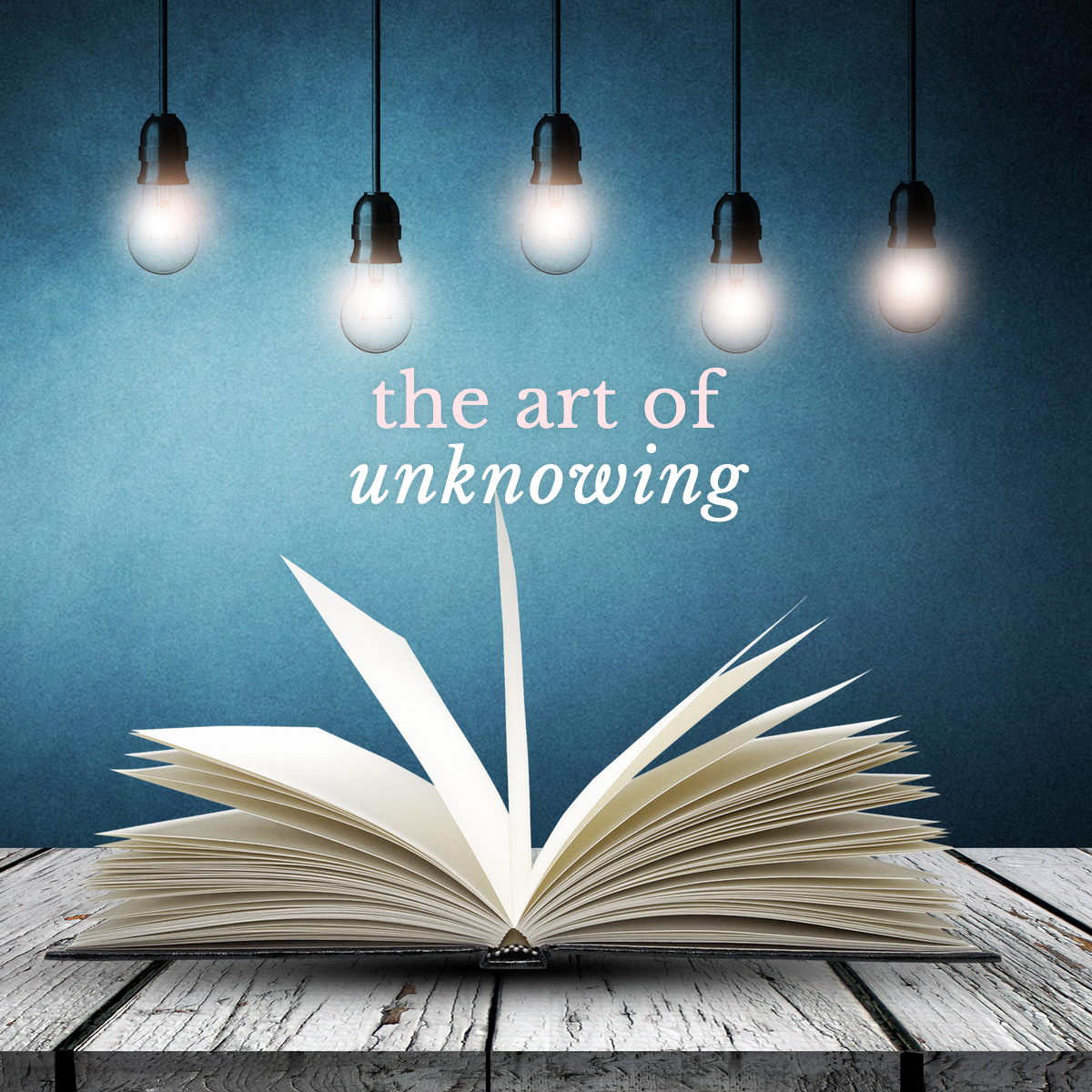
How can we remember our ignorance, which our growth requires, when we are using our knowledge all the time?
Henry David Thoreau
A week ago, I had a hysterectomy. During the course of my preparation for this surgery, I ran into knowledge traps galore. Do you know what a knowledge trap is? Let me enlighten you…
Before we know or learn something, we obviously DON’T know it. But for most of us, once we learn it, we forget what it was like to not know it. It’s almost like our brain thinks it’s ALWAYS known this thing. And in this state, it’s almost impossible to remember what it’s like NOT to know it.
Now that might not sound like a bad thing at all. And in many situations, it doesn’t matter. But in my life, particularly in business, it’s a critical skill and one to which I’m particularly attuned.
What Does It Mean To Unknow?
The art of “unknowing” something is to hold knowledge while at the same time remembering what it was like to NOT know things.

This state is vital for bridging communication, teaching, and education. When you can’t “unknow”, it’s difficult to treat people who don’t know something with kindness, gentleness, and respect.
I’ll try to give an example to illustrate.
As an adult, you know how to do laundry. You learned it along the way somewhere and now it is second nature:
- sorting clothing
- understanding how much clothing a machine can handle
- how much detergent to use
- care labels
- which clothes to line dry versus machine dry
- what might shrink and what might not
- which treatment should be use on different types of stains
You probably don’t even need to look at labels any more because you have a strong sense of what materials need to be line dried, which things are likely to shrink in the dryer, which have dyes that may stain other colors in the washing machine. You just…know. And yet, the first time you are faced with someone who doesn’t know or understand these things, you may approach it with impatience.
- How do you NOT know how to do laundry?
- You put those colors together?
- OF COURSE it was going to bleed.
- Those clothes shrunk because they should never have been dried on hot.
You just…know. And it doesn’t make sense why another person doesn’t just KNOW the same things.
But if you can remember a time when you didn’t know – or you can even just imagine how confusing it would be if you didn’t know the things you know – then you can start to teach and explain the nuances to someone who is just learning how to use a washing machine for the first time.
Couple this with most people’s desire to NOT seem ignorant or ask questions and you can probably see the problem. If we assume everyone knows what we know (or should) and they are afraid or reluctant to admit they don’t understand the thing we assume they should know, then we believe we have communication and connection and understanding when in fact, we do not.
When was the last time you did something for the first time?
John C. Maxwell
As adults, we think our “first times” dwindle but really there are so many out there in the world – things we’ve never done before. Some will be far fetched – like climbing Mount Everest, but others are very mundane – like taking a subway in a new city.
Knowledge Traps
In my business, the knowledge trap rears its head nearly every day. Once you know something, it’s hard to remember not knowing it. You’ve ALWAYS known it. EVERYONE knows it!
People have blind spots. It doesn’t make them bad people. It just means that they have to be reminded that not everyone comes from the same point of knowledge as they do.
Acronyms are a great example. In our business we have a ridiculously long list of acronyms. Acronyms require context. If they refer to internal and proprietary things, then for someone starting fresh, they are incredibly confusing and alienating. When we talk to a new hire, we have to be cautious to give them a chance to gain context, understand our business, understand the full names and meaning of things before we start slinging abbreviations about willy nilly. And just knowing this isn’t enough. It requires discipline and focus to stay in this temporary ignorance or state of “unknowing” as we train them.
Back to my hysterectomy.
In case you don’t know the term, “hysterectomy” is the removal of the uterus (that place babies are grown). It can be done for a variety of reasons, but each woman only has one uterus. This means we can only remove it once. This is a great example of a knowledge trap – I almost didn’t explain it.
My Context
- I’ve only had a few surgeries in my life.
- I’ve never stayed overnight in a hospital.
- Having only one uterus, I’ve never had a hysterectomy before.
So…I’m a newbie. I have no experience, no information, and a ridiculous number of questions. I have basically EVERY question that could be had about having a hysterectomy because – I’ve never had one.
On the other side of the aisle, my cast of characters is a well oiled hospital machine.
- There is the surgical scheduler who, day in and day out, scheduled surgeries for her doctor group.
- There is the doctor who went to school and specialized and now is a renown expert for robotic hysterectomies and is sought after for a myriad of surgical procedures on women’s reproductive organs.
- The admitting staff have run thousands and thousands of patients through intake.
- Anesthesiologists (the people who knock you out) have put hundreds and thousands of people under for surgery.
- Nurses and phlebotomists (the folks who take your blood) have drawn samples and cared for hundreds and thousands of patients.
- And on, and on, and on.
Every single person in this chain was stuck in a knowledge trap – unable to see it and therefore unable to help me.
I am a tenacious advocate for myself and I’m willing to be a pest to get the answers that I want. I’m willing to make a fuss, perhaps make some “enemies”, do my research, look for resources – because I do better when I’m well armed with information and details.
Everywhere I turned, people were so used to their function and their job, they couldn’t understand or relate to MY experience. Sure they had all done this thousands of times before. But this was my FIRST time. This will be my ONLY time getting a hysterectomy. And I had ALL the questions.
Unlike many, I have no issue acknowledging my ignorance and asking questions. I care about learning, I don’t care about someone’s impression of me.
I’m sad to report that despite my best efforts, I didn’t get those questions all answered. I got rude and curt responses. I got ignored. I frustrated people who took it out on me by lowering the quality of their care for me. It was a horrible experience.
I don’t write this to complain about what happened. (I am writing a letter to the hospital system CEO and president to try to give them a fresh perspective on this issue. I also took time to speak with each person at each step, at length, to try to open their eyes to their knowledge trap.) I want to raise awareness and try to provide a solution so the next scared person facing this for the first time doesn’t have to go through what I went through.
The art of “unknowing” is really about empathy. But you can’t really be empathetic if you don’t match the other person’s knowledge and understanding. And you can’t do that without taking time to talk with them. If someone can’t be empathetic, then you can gently nudge them and introduce them to the concept of knowledge traps.
I know you do this every day. But please understand that every single bit of this is new to me and I can’t get anyone to answer my questions and set my mind at ease. Please try to put yourself in my shoes.
The concept of unknowing is a powerful one. Most of us aren’t even familiar with the concept of knowledge trap. That makes it hard to put your finger on what isn’t quite working when you interact with people. But maybe now that you’ve been introduced to the notion, you’ll notice it. The next time you are learning something new, or the next time you are faced with someone who doesn’t innately know the things that you know, maybe you’ll practice the art of “unknowing”.
The knowledge trap exists everywhere. The laundry example shows you that no one is immune. But I find it particularly problematic in medicine, law, and finance. If you are in any of these fields, I encourage you to sit with this notion a bit and see what you might do to refine your ability to “unknow” things.
For me personally, it’s been a career differentiator. It makes me extremely good at my job. Maybe it can make a difference for you too!
I’m always curious about other people’s experiences and stories. Let’s start a dialogue. What knowledge trap experiences have YOU had? Please share them in the comments below.